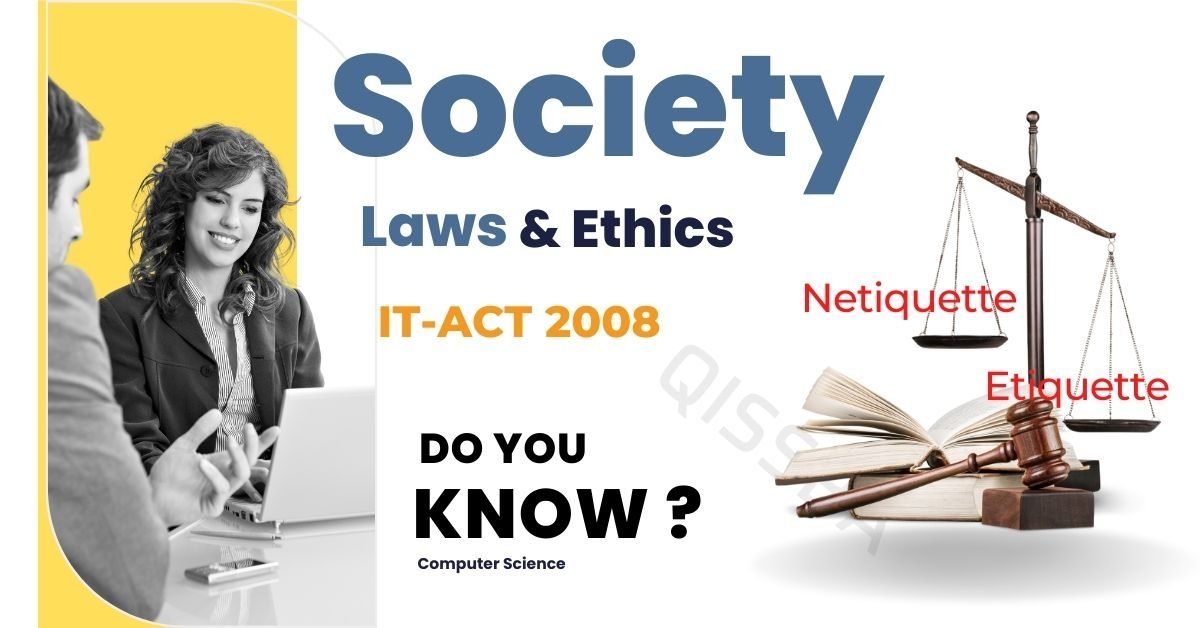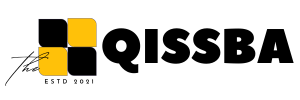
Society Laws and Ethics in Computer | CBSE Class 12
Introduction
Computer science has many social and legal issues with society laws and ethics including:
Cybersecurity: A societal and legal issue that affects your personal self. Cybersecurity threats include hacking, malware, and other issues that can compromise your data and networks.
Privacy: The collection of personal data can endanger information privacy. As more programs connect with users, their privacy is increasingly jeopardized.
Algorithmic bias: Algorithmic bias can lead to discrimination.
Digital divide: The digital divide can cause inequality in access to technology.
Artificial intelligence: Ethical concerns arise around artificial intelligence and automation.
Computer crime: Computer crime is defined as a crime that involves a computer system as an object, instrument, or repository of evidence.
Cultural issues: Cultural issues are about how groups of people with particular beliefs, practices, or languages may be affected.
Environmental issues: Environmental issues are about how computer science impacts the natural world.
Companies can address the ethics of artificial intelligence by implementing the principles of corporate governance of IT.
Legal Concerns
- Data protection and privacy concerns
- Intellectual property rights
- Cybercrime, such as hacking or identity theft
- Legal compliance in software development and data usage

This tutorial covers all necessary topics/concepts required to complete your exams preparations in CBSE schools / classes 11th and 12th.
Society Laws and Ethical Issues
We are now living an era called the information age where we see that most our activities are technology-influenced, be it making an online payment, creating or development of own piece of art or information (such as writing articles or clicking photographs and so forth). With the reach of technology to our day life, there has been a paradigm shift, and it has also raised specific issues and problems related to society, ethics and law. In this chapter, we shall talk about topics about this very domain such as intellectual property rights, plagiarism, cybercrime, cyber law, e-waste management etc.
Ethical Issues
These days, we can easily say that our society is information society and our era is information era. As we all know that information is the means to acquire Knowledge. In other words, we can say that information forms the intellectual capital for a person or body. However, there are many ethical issues involved with the usage and availability of information.
Some common ethical issues are:
- Intellectual property rights
- Plagiarism
- Digital property rights
Intellectual Property Rights
As mentioned earlier, information makes intellectual property. Any piece of information is produced or created with a lot of efforts and it consumes a lot of time. The cost factor is also involved with the creation or production of information. Though once produced, it becomes very easy to duplicate it or share it with others. But this very thing makes information difficult to safeguard unlike tangible property.
The creator/producer of the information is the real owner of the information. And the owner has every right to protect his / her intellectual property. To protect one’s intellectual property rights one can, get information copyrighted or patented or use trademarks.
The ethical issue involved with it is that information must not be exchanged without the consent of its owner.
The intellectual property rights must be protected, for it:
- Encourages individuals and businesses to create new software and new software applications, as well as improving existing applications,
- Ensures new ideas and technologies are widely distributed,
- Promotes investment in the national economy.
Plagiarism
Simply put, plagiarism means stealing. Surprised? If you look into an English dictionary to find the meaning of word plagiarism, it will give somewhat like “the unauthorized use or close imitation of the language and thoughts of another author and the representation of them as one’s own original work.’’
Thus, Plagiarism is stealing someone else’s intellectual work (can be an idea, literary work or academic work etc.) and representing it as your own work without giving credit to creator or without citing the source of information.
Any of the following acts would be termed as Plagiarism:
- Using some other author’s work without giving credit to the author.
- Using someone else’s work in incorrect form than intended originally by the author/creator.
- Modifying/lifting someone’s production such as music-composition etc. Without attributing it to the creator of the work
- Giving incorrect or incorrect source of information i.e., wrongful citation.
- Failure in giving credit or acknowledging the contribution of others in a collaborative effort, to which you are also part of.
How not to plagiarize
As most universities1 put in their student-handbook. ‘To avoid plagiarism:
- Another person’s idea, opinion, or theory;
- Quotations of another person’s actual spoken or written words; or
- Paraphrase of another person’s spoken or written words.
Plagiarism is Offence
‘if plagiarism involves copying not only ideas but also a substantial portion of a copyrighted work without attribution and without permission, it would amount to both copyright infringement and the violation of the ‘special right’ of the author to be credited.
Copyright infringement and the violation of an author’s right be credited are both civil wrongs and criminal offences. A civil suit may be instituted, and criminal charges may also field’2.
Both civil suit and criminal charges are punishable offences and amount to fine and penalties.
Digital Property Rights
Digital property (or digital assets) refers to any information about you created by you that exists in digital form, either online or an electronic storage device. All of your digital property comprises what is known as your digital estate.
Examples of digital property include: any online personal accounts, such as email and communications accounts, social media accounts, shopping accounts, photo and video sharing accounts, video gaming accounts, online storage accounts, and websites and blogs that you manage; domain names registered in your name; intellectual property, including copyrighted materials, trademarks, patents and any software or code (such as software tools created by you or games or apps created by you) you may have written and own etc.
Digital Property rights lie with the owner. Legally a person who has created it of r the owner who has got it developed by paying legally is the legal owner of a digital property. Only the owner can use and decide who all and in what form can/her digital asset may be used by other, whether by making payments or by buying it or by obtaining its license or usage rights etc. But this is not the case generally; there are many threats to digital properties.
Threats to Digital Properties
Let us briefly talk about common threats to digital properties
- Digital software penetration tools: Although one needs to buy usage rights or license to use a digital property, there are many software penetration, tools such as cracks and key-gens, tools created by hankers to penetration your software’s registration system and enable unauthorized users to freely access your software without actually paying for it.
- Stealing and plagiarizing codes of your digital properties: Sometimes other developers somehow get hold of your software’s source code and then create plagiarized versions of your code and use it in their own software. In other word’s they steal your software\s source code and use it to build their own versions of it, and then shell it under their own company name.
Digital Property Rights Protection
As there are multiple types of threats to digital properties, there are many ways you can ensure protection of your digital properties.
- Anti- Temper Solutions: There are many anti-tamper solution available which ensure that your digital property is tamper-proof. These anti-temper solutions use a host of advanced technologies to prevent hackers from hacking, reverse-engineering or manipulating your digital properties such as utility tools, apps, video games and so forth.
- Legal Clauses: Add legal clause in the clauses of use of your software/digital properties. You must include a transparent clause in your software’s terms of service that prohibits the scraping of your software’s source code for reuse. This is a sound legal backup for you/
- Limit the sharing of software code: You should share your software code only with trusted individuals who are part of development team. You should also use a Digital Right Management (DRM) solution to protect software from being scraped source code using de-compilers etc.


